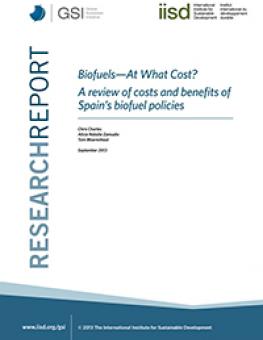
Biofuels At What Cost? A review of costs and benefits of Spain's biofuel policies
This report evaluates some of the principal issues associated with Spain's biofuels industry, support policies, employment creation, emission abatement and the role of biofuels and other renewable transport technologies in meeting EU renewable energy targets.
The report assesses the costs and benefits of Spain's policies in meeting the objectives that EU member states have set out to achieve—increased energy security, improvements in environmental performance and the generation of additional economic value. The report finds:
- Support to Spain's biofuel industry in 2011 was estimated at between €213 million and €237 million for ethanol and from €955 million to €1,002 million for biodiesel.
- 2011 carbon abatement costs for ethanol were €488 per tonne CO2 avoided and €194 per tonne for non-land based biodiesel. Conventional biodiesel was responsible for net emissions increases and no abatement cost can be calculated.
- There is a wide range for the number of direct and indirect jobs created by the Spanish biofuels sector estimated at between 3,797 and 12,055 in 2011. Job estimates are based on a variety of job-counting approaches used in measuring biofuel and renewable energy jobs reflecting the challenges in assessing the numbers and quality of sectorial jobs.
- More than 75 per cent of biodiesel consumed in Spain was imported in 2011. Around 95 per cent of biodiesel feedstock was imported with 90 per cent coming from Argentinian soy and Indonesian palm oil. Spain also imported 73 per cent of the feedstock used in ethanol production eroding energy security benefits due to a high reliance on foreign imports.
A number of policy recommendations are provided to promote the sustainability and effectiveness of Spain's biofuel policies.
Participating experts
You might also be interested in
Assessing the Cost-Effectiveness of Renewable Energy Deployment Subsidies: Solar PV in Germany and Spain
This study reviews deployment subsidies for solar PV in two European countries, Germany and Spain. It forms one of a series of three looking at the cost-effectiveness of renewable energy deployment subsidies, each one focusing on different technologies and countries.
Measuring Irrigation Subsidies: Policy recommendations from a Spanish case study
The Cost of Fossil Fuel Reliance
Government support for fossil fuels reached at least USD 1.5 trillion in 2023, new data shows.
Increased Support Needed to Achieve India's Clean Energy Goals
India is on track to achieve many of its 2030 clean energy goals but needs to step up government support measures to accelerate the deployment of offshore wind, electric vehicles, and green hydrogen, according to a new report.